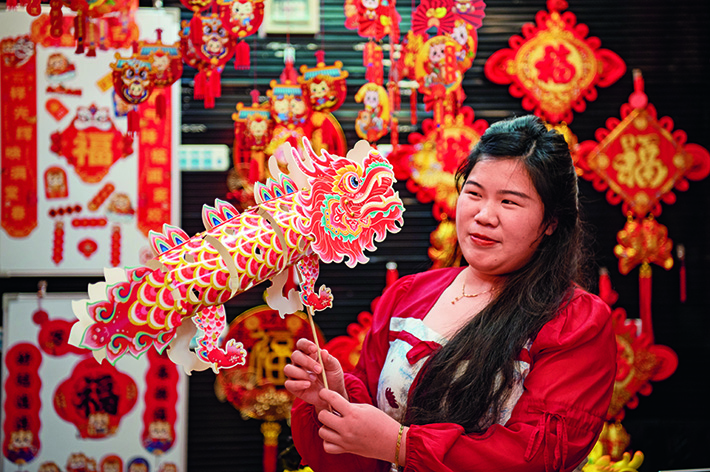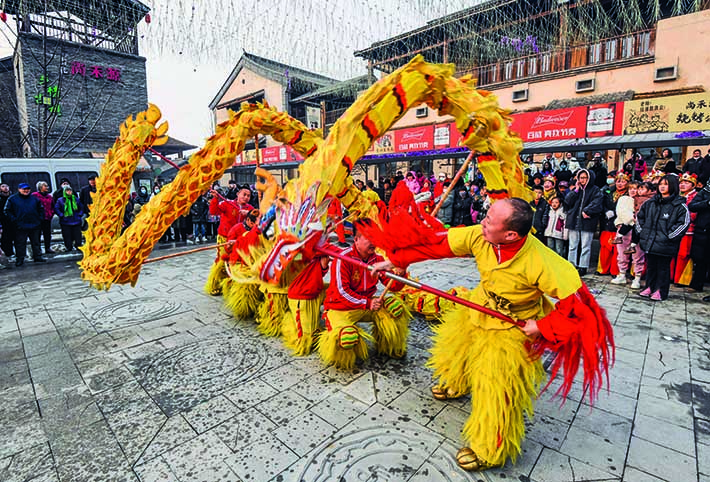|
||||||||||
| Home Nation World Business Opinion Lifestyle ChinAfrica Multimedia Columnists Documents Special Reports |
|
||||||||||
| Home Nation World Business Opinion Lifestyle ChinAfrica Multimedia Columnists Documents Special Reports |
| ChinAfrica |
| Welcoming The Year of Dragon |
| As an animal in the Chinese zodiac system, the dragon is revered for the virtues of dominance, strength and ambition |
| By Xia Yuanyuan | VOL. 16 February 2024 ·2024-02-28 |

Mascots on sale for the Year of the Dragon in Yiwu International Trade City, east China’s Zhejiang Province, on 11 December 2023 (CNS)
People across China have begun decorating their houses, pasting poetic couplets and auspicious words on the doors, buying new clothes, and getting ready to make dumplings. You guessed right - it’s time to celebrate the Spring Festival, and ring in the Chinese New Year - the Year of the Dragon.
In the 12-year Chinese zodiac cycle, 12 animals represent 12 years. The rat is the first animal in the cycle, followed by ox, tiger, rabbit, dragon, snake, horse, goat, monkey, rooster, dog and pig. This year, New Year’s Day falls on February 10. It is considered to be especially auspicious for those born in a dragon year - 2012, 2000, 1988, and so on.
Dragons in mythology
The dragon is a character based on a 7,000-year-old Chinese legend, which has a horse’s head, a snake’s body and chook’s claws. As an important element in traditional Chinese culture, it has rich symbolic meanings including authority, auspiciousness, luck and power to rule over wind, clouds, rain, lightning and thunder.
Chinese people claim they are the descendants of the dragon, based on stories that are firmly rooted in the folklore and history. For example, an anecdote in Shiji, or Records of the Grand Historian, the foundational text of Chinese history dating back to the first century B.C., describes the birth of Liu Bang, the first emperor of the Western Han Dynasty (206 B.C.-A.D. 8): “One day, his mother falls asleep at a riverside and sees in her dream a dragon lying on her body, only to wake up and find herself pregnant.” The anecdote became popular because of the belief that a dragon appearing in a pregnant woman’s dream was an auspicious sign indicating she would give birth to a future emperor.
According to another legend, there is a dragon lying beneath the city of Beijing, the capital of the Yuan Dynasty (1271-1368), Ming Dynasty (1368-1644), Qing Dynasty (1644-1912), and the People’s Republic of China. It is said that Beijing, like many other ancient capitals, has a “dragon vein,” an important fengshui (the traditional Chinese study of geomancy) phenomenon that can affect the fate of a nation. According to a local legend, Beijing doesn’t just run on “dragon blood,” there is a whole dragon imprisoned underneath the capital city’s ground. According to the legend, the dragon has been chained underground since the founding of the Ming Dynasty.
The dragon is also said to control water. According to another ancient legend, there are four Dragon Kings who are the divine rulers of the oceans. They control weather and bring rainfall. As befits kings, each has a royal court and commands an army of ocean creatures. The Dragon Kings appear many times in classical literature, most famously in the epic Journey to the West. Their magical powers extend far beyond controlling the weather, as they can appear in dragon form, human form, or as massive spouts of water. Even today, shrines throughout China honour the Dragon Kings and travellers seek their blessings at the start of a new journey.
Dragons in culture
For several thousand years in Chinese history, the yellow dragon has been a symbol of royal rights and social status. Chinese emperors’ fondness for the yellow dragon transformed it into a symbol of the imperial family. The royal association with the yellow dragon became so strong that for a time, only the emperor and his family were allowed to wear the colour. Rulers did everything they could to maintain this mythic association, surrounding themselves with dragon-related ornamentation. For example, the imperial throne is called the dragon seat and the emperor’s ceremonial robes are called dragon robes.
Given all the positive associations of dragon, it is no wonder that the Chinese character long is a top choice for people’s names, including martial arts superstars Jackie Chan (Cheng Long) and Bruce Lee (Li Xiaolong). There is also the Chinese idiom, wang zi cheng long (literally, hoping one’s son will become a dragon), which shows parents have high expectations of their children.
Dragon dance is an important cultural performance used to celebrate festivals in China. It used to be a medium to pray the gods for rain, but now it is also a representation of people’s courage, pride and wisdom. The dancers move in coordinated and rhythmic steps and perform to the music of loud gongs and drums. It is said that the longer the dragon is, the more luck it will bring to the community. Some dragons are so long that they require 20 or 30 people to carry the tail.
The traditional Chinese Longtaitou Festival, or Dragon-Head-Raising Festival, falls on the second day of the second lunar month, and represents the start of spring and farming season. Ancient people believed that after this day, rainfall increases because the rain-bringing Dragon King has awakened from his winter sleep. As a well-known phrase goes, “On the second day of the second month, the dragon lifts his head (er yue er, long tai tou).”
Another festival related to the dragon is the Dragon Boat Festival, or Duanwu Festival, one of the four major traditional Chinese festivals with a history of more than 2,000 years. The festival is celebrated on the fifth day of the fifth month on the lunar calendar in memory of Qu Yuan, a famous patriotic poet who lived more than 2,000 years ago. According to legend, he drowned himself in the Miluo River in what is now Hunan Province to protest against corruption in his kingdom. On that day, the dragon boat races are held across China, and even in other countries. The races symbolise a search for Qu’s body. Besides, it is said that it is a day when the dragon takes to the skies. Therefore, the dragon boat race is a way to worship the flying dragon.

Locals perform dragon dance to celebrate the New Year in Zunhua, north China’s Hebei Province, on 30 December 2023 (CNS)
The dragon personality
Like the horoscope, the animals in the Chinese zodiac system represent certain personality traits. If your zodiac sign is dragon, you are likely to be full of ambition, capacity, value dominance, authority and dignity. Dragon people prefer to live by their own rules and are usually successful. They’re driven, unafraid of challenges, and willing to take risks. They’re passionate in all they do, and they do things in grand fashion. Unfortunately, such passion and enthusiasm can leave dragon people feeling exhausted and, interestingly, unfulfilled.
While dragon people frequently help others, rarely will they ask for help. Others are attracted to dragons, especially their colourful personalities, but deep down, dragons prefer to be alone. Perhaps that is because they’re most successful when working alone. Their preference to be alone can come across as arrogant or deceitful, but that is not the case.
|
||||
| About Us | Contact Us | Advertise with Us | Subscribe |
| Copyright Beijing Review All rights reserved 京ICP备08005356号-5 京公网安备110102005860号 |